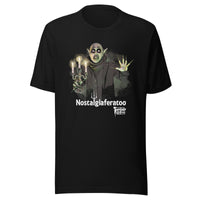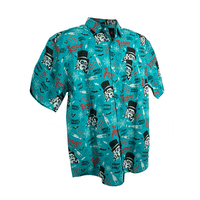7 criminally underrated TV Westerns of the 1970s
Not even William Shatner and Kurt Russell could help these gems stick around.

Image: The Everett Collection
"The Rural Purge" was not entirely effective. At the start of the 1970s, television networks shunned the folksy programming of the 1960s, cozy content like The Andy Griffith Show and The Beverly Hillbillies, to make way for sharper sitcoms set in the big city. Mary Tyler Moore and Laverne & Shirley were now the norm, not Petticoat Junction.
This sea change also brought the Western era to an end. In the late 1950s, Westerns were a whopping portion of the TV schedule, with dozens of dusty adventures spread across the three big channels. By the early-'70s, only old reliable horses like Gunsmoke and Bonanza remained on the trail.
Of course, this is generalizing. Of course, "rural" programming did not entirely disappear. Hee Haw kicked off at the start of the Rural Purge and kept going strong for decades. You can also point to smash scripted shows like Little House on the Prairie or The Waltons.
Plus, the studios continued to churn out fresh Westerns for the small screen. They just didn't fare so well against the likes of Charlie's Angels.
Here are a handful of interesting '70s TV Westerns that might have been a little out of fashion, but compelling nonetheless.

1. Alias Smith and Jones (1971–73)

Modeled after Butch Cassidy and the Sundance Kid, Alias Smith and Jones was a wonderful early-'70s series with humor, anti-heroes, grit and guns. The cast was stellar, too, including Sally Field. Pete Duel (pictured here) starred as Hannibal "Honest John Smith" Heyes. On New Year's Eve 1971, the rising TV star committed suicide. The executive producer tactfully wanted to end the series, but the network pushed forward, promoting narrator Roger Davis to the role of H. Heyes for the final 17 episodes.
Image: NBCUniversal
2. Dirty Sally (1974)

Dirty Sally holds the distinction of being the only spin-off of Gunsmoke in the show's 20-year run. Perhaps they shouldn't have waited so long. This series began as the two-part finale of season 16, "Pike," in which a young gunslinger named Cyrus Pike (Dack Rambo) is nursed back to health by a toothless outcast named Sally. Sally, a sort of cross of Yosemite Sam and a crusty old witch, was played by the venerable Jeanette Nolan, who had once starred alongside Orson Welles as Lady Macbeth. Nolan had also guest-starred on Gunsmoke more than any other woman, so she deserved this headlining role. She earned an Emmy nomination for this role. But it was no match for Sanford and Son. CBS pulled the plug before the Emmys were handed out.
Image: The Everett Collection
3. Barbary Coast (1975–76)

The ten-year stretch between the cancelation of Star Trek and Star Trek: The Motion Picture was a rocky one for William Shatner. At one point in the early 1970s, he was living in a pick-up truck in the San Fernando Valley. To his credit, Shatner pushed to break stereotype, took work where he could find it, studied karate, even appeared on game shows. He booked small guest spots on series such as Ironside, Mannix and Mission: Impossible. Finally, in 1975, Paramount gave the actor another shot at headlining a primetime show. Barbary Coast would revive the sort of fantastical western adventure last seen a decade earlier on The Wild Wild West. The concept of having a go-for-it actor like Shatner slip into various personas was rather inspired. He clearly enjoyed being a man of many faces. The series itself enjoyed a decent slot leading into Monday Night Football — the same hour Gunsmoke had held on a different network. But it could not beat Phyllis and Rhoda.
Image: The Everett Collection
4. Sara (1976)

When it came to Emmys, Michael Learned was hard to beat. After taking the trophy home over Jeanette Nolan, she won another golden statue in 1976, besting Brenda Vaccaro for Outstanding Lead Actress in a Drama Series. The fact that Vaccaro earned a nomination, while wildly deserving, was a triumph in itself. She was up for headlining this series about a schoolteacher in 1870s Colorado. It held the same time slot (on another network) as Barbary Coast, picking up just as Shatner left. You couldn't beat Redd Foxx in back then.
Image: The Everett Collection
5. The Quest (1976)

A great cast and a compelling concept could not keep The Quest from getting trampled by Charlie's Angels. A young physician from San Francisco (Tim Matheson) teams with his wilderness-savvy brother (Kurt Russell) to find their missing sister, who is a captive of the Cheyenne. A successful TV movie led to a short-lived series. It did earn an Emmy nomination for costume design, at least.
Image: The Everett Collection
6. How the West Was Won (1976–79)

Also beginning as a successful TV movie (well, two actually), How the West Was Won was a superbly cast and crafted Western, perhaps the last of its kind on network television. Much of its gravitas was due to grizzled Gunsmoke star James Arness in the lead role. Arness played a rugged mountain man leading his Virginian family to a new home out west. The strong regular cast of Bruce Boxleitner and Eva Marie Saint was boosted by memorable guest stars like Ricardo Montalban and Ken Curtis. It played more like today's prestige television than the episodic fare of the era. The show's pedigree and plot was enough to keep it on the air for three short seasons.
Image: The Everett Collection
7. The Oregon Trail (1977)

With a plot quite akin to How the West Was One, The Oregon Trail (no relation to the popular educational computer game) cast Rod Taylor of The Time Machine and The Birds in the lead role. Taylor even co-wrote the theme song. The series brought to mind Wagon Train. No wonder — Terry Wilson, who played assistant trail master Bill Hawks on Wagon Train, worked as a production supervisor here. NBC cut off supplies to for this journey after a mere six episodes. The rest of the filmed episodes went unaired in the U.S., but the Brits got them on BBC 2.
Image: The Everett Collection
SEE ALSO: THE 11 BEST VINTAGE LUNCH BOXES BASED ON CLASSIC WESTERNS







5 Comments

Bruce Campbell was awesome.
Then there was that popular Western serious on HBO with all the cussing.



























